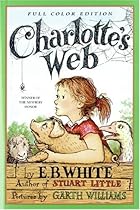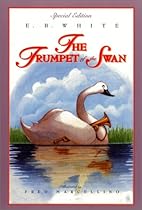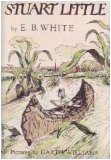I reread three E.B. White favorites from my childhood this week, and as I’ve realized with other childhood favorites, these aren’t so favorite anymore. I reread Charlotte’s Web, The Trumpet of the Swan, and Stuart Little. I enjoyed them, but they are each a little odd.
I realized when I went to write up my thoughts that I’m inclined to mention the endings, but the more I thought about it, I realized I can’t discuss these books as an adult without doing so, since the overall themes are what interest me. In some respects, knowing the ending of children’s books, though, doesn’t really seem to “spoil” the book, since children’s books are more about the stories, the feel, and the overall themes.
What do you think? Does knowing the ending of a 150-page children’s book “spoil” it for you? What if you take the fact that these books are 30-60 years old in to consideration?
I don’t think knowing the endings would spoil these novels, but if you think it would, don’t read the rest of this post.
Charlotte’s Web
 In Charlotte’s Web, the runt of the litter is saved by the smallest farm creature, a spider. Charlotte the spider befriends Wilbur the pig when he moves to Zuckerman’s barn, and her talent for weaving words in to her web shows the world that Wilbur is “Some Pig” and definitely much too special to be killed for holiday dinner. While Wilbur is the one whose life is saved, it’s interesting to realize that Charlotte is actually the creature to be praised.
In Charlotte’s Web, the runt of the litter is saved by the smallest farm creature, a spider. Charlotte the spider befriends Wilbur the pig when he moves to Zuckerman’s barn, and her talent for weaving words in to her web shows the world that Wilbur is “Some Pig” and definitely much too special to be killed for holiday dinner. While Wilbur is the one whose life is saved, it’s interesting to realize that Charlotte is actually the creature to be praised.
When Mr. Zuckerman tells his wife about the spider web and how Wilbur is a very special pig, Mrs. Zuckerman isn’t quite sure.
“Well,” said Mrs. Zuckerman, “it seems to me you’re a little off. It seems to me we have no ordinary spider.” (page 80)
Charlotte’s Web, therefore, is about service and about true friendship, for Charlotte in the end has spent her life for Wilbur’s cause, even though she was never recognized as the one who made the difference in Wilbur’s life.
My first grade teacher read me Charlotte’s Web, and I’m sure I reread it a few times myself as a child. I loved this book. As an adult, I felt it was a bit dated and slow, but that may be a result of my reading it aloud to my two-year-old at a rate of about five pages a day. Children may still relate to the themes of friendship that permeate.
The Trumpet of the Swan
 In The Trumpet of the Swan, Sam Beaver befriends a wild trumpeter swan named Louis who was born without a voice. Louis learns to write (by going to school with Sam) and later to play the trumpet, successfully working as a nightclub performer in Boston for years in order to pay back his debt to society (the trumpet had been stolen). In the end, the wild calls him back.
In The Trumpet of the Swan, Sam Beaver befriends a wild trumpeter swan named Louis who was born without a voice. Louis learns to write (by going to school with Sam) and later to play the trumpet, successfully working as a nightclub performer in Boston for years in order to pay back his debt to society (the trumpet had been stolen). In the end, the wild calls him back.
I related to Trumpet as a child because I played the trumpet in my elementary school band. As an adult, I found the story rather ridiculous. I think that ridiculousness is the purpose, however, for White seems to be commenting on acceptance. Is Louis’s arrival and acceptance in grammar school (and in Boston, and in Philadelphia) a commentary on the 1960s racial issues that were dominating society at the time? I don’t think White is saying that such racial acceptance is ridiculous: rather, he’s illustrating how easy it was to accept Louis. Why not give him a job? He’s a great trumpeter!
One thing in the book irked me. In order to get Serena, the love of his life, out of the zoo without getting her wings clipped, Louis promises the zookeeper that they’ll bring one of their cygnets back to the zoo. Louis didn’t want himself or Serena to be trapped in a zoo, but he didn’t hesitate to promise one of his young. That seemed disingenuous to the entire story, which until that point had celebrated his freedom to be himself and to cross the boundaries between humans and the wild. I also went to the zoo recently, and I don’t think any animal would choose to be in there, let alone will it upon their children!
That said, The Trumpet of the Swan is a creative look at acceptance in society, and it’s a fun story of a swan and a boy being good friends.
Stuart Little
 As the first book White published for children, published in 1945, Stuart Little is short and sweet at just 130 pages. And yet, I think there is more in this book that might interest adults than in any of the other two books. Stuart is the second son born to the Little family, and he is a two-inch high mouse. Through a series of adventure stories, we see Stuart leave his parent’s home and set off in to the big world. He’s seeking his friend Margalo the bird, and the book ends before he finds her.
As the first book White published for children, published in 1945, Stuart Little is short and sweet at just 130 pages. And yet, I think there is more in this book that might interest adults than in any of the other two books. Stuart is the second son born to the Little family, and he is a two-inch high mouse. Through a series of adventure stories, we see Stuart leave his parent’s home and set off in to the big world. He’s seeking his friend Margalo the bird, and the book ends before he finds her.
Stuart Little didn’t feel like a children’s story. The New Yorker had an interesting article last year about the development of literature for children and E.B. White’s writing of Stuart Little. I mentioned it last July, and I thought of it often as I reread Stuart Little.
I would have to say that Stuart Little is not a childish story. A very young Stuart (at one point it said he was seven, and it was unclear to me whether he’d grown up before the end of the book) goes through painful and possibly fatal experiences. And then he runs away from home, essentially to seek his fortune and his friend. It ends, and he’s still searching. We don’t know if he’ll be okay; we don’t know if he’ll be eaten; we don’t know if his ending is happy.
I believe it ended happily. The novel Stuart Little is about growing up. Stuart feels out-of-place in his family, and he’s seeking a place in the greater world. We never quite finish growing up, and our happy endings are not always clear cut. As an adult, I enjoyed reading about his search more than I enjoyed reading the other two, more child-like stories.
Apparently, though, many dislike E.B. White’s first novel. If you are at all interested in the history of children’s literature, I’d highly recommend The New Yorker’s article.
Which E.B. White children’s novels have you read? Do you think Stuart Little is an appropriate children’s book?




A Watched Plot Never Spoils!
I loved all three when I was young, Stuart Little the most, pehaps.
I loved Charlotte’s Web as a child, but I haven’t heard of the other two. I’ll have to make sure I get them when my boys are bigger.
I absolutely loved Charlotte’s Web & Trumpet of the Swan when I was small, and Stuart Little too (but not as much). They’ve aged pretty well with me, because the humor is still funny – the goose in Wilbur’s farm cracks me up. Trumpet of the Swan is my favorite by a lot. I love every single scene the swan father is in. He is one of my favorite characters in all of literature.
I haven’t read Charlotte’s Web in ages, but I loved it dearly as a child. When I think about the ending, I still get choked up, and I still think that Templeton is a fabulously wicked name!
I am familiar with Stuart Little (I don’t think I read it, but I believe I saw the movie when I was babysitting as a teen), but not The Trumpet of the Swan. So clearly of all three, Charlotte’s Web holds the fondest place in my heart.
I haven’t read any of the books since I was a child, but they were some of my favorites. I loved Trumpet of the Swan — but now, like yourself, I would definitely find the idea of abandoning a child for my own freedom abhorrent. Amanda and I were discussing Mr. Popper’s Penguins, [SPOILER ALERT!] which has a similar plot development. It’s so interesting that we can read a book so differently from an adult perspective.
Oh I loved Charlotte’s Web as a child and as a teenager. I think I’d like to re-read it now and see what I think of it.
I loved Charlotte’s Web as a kid and a teen. I haven’t read it since, though I still have my childhood copy and take it off the shelf and read the end now and then and it still makes me cry. I read Trumpet of the Swan but don’t remember much of the story but I know I liked it. It didn’t capture me like Charlotte did though. And I have not read Stuart Little. My husband has and he mentions it sometimes as one of his favorite books when he was a kid.
Amateur Reader, I LOVE that post of yours! That gives me some more thoughts for a future post….
I like to mention “spoilers” but I to am inclined to put it in quotation marks. After all, I’m one who has no hesitation to read the last page first, and I know most people are not!
Jackie, I did enjoy them but they were dated — and not nearly the favorites they were when I was a kid!
Jenny, Yeay! I’m glad you like Trumpet. It seems that’s the one fewest have heard of or remembered.
Steph, Stuart Little the book is quite different from the care-free, silly movies they make. The book is….less child-like. I’d say it’s almost more of an adult book in tone and themes.
Karenlibrarian, I saw Amanda’s post. I wonder what I’d think of Mr. Popper’s Penguins today, as that is another I loved as a child…
Bella, I hope you enjoy the reread!
Stefanie, I didn’t recall the details of Trumpet either. I guess it doesn’t often stand out as Charlotte’s Web did. I wonder why? Both are good.
I know I read Charlotte’s Web and Trumpet of the Swan when I was little, and I’m pretty sure I read Stuart Little, too.
J.T., yeay! Another fan from childhood! I think Stuart Little was the one I least remembered from childhood — just more “adult” than the others, I think.